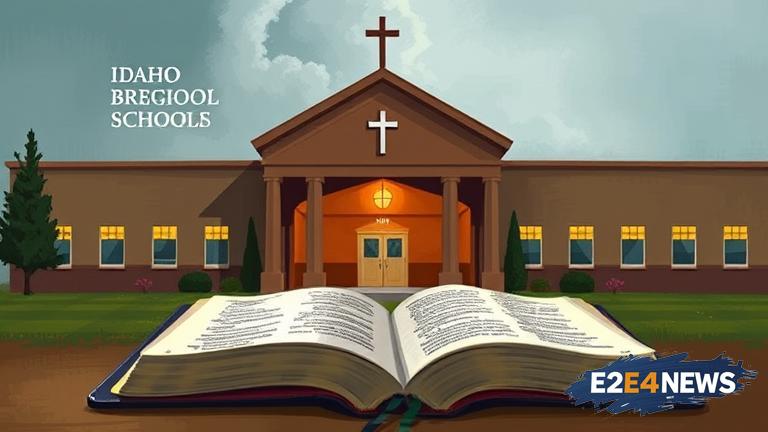A recent proposal in Idaho has sparked a heated debate over the role of religion in public education. The bill, which aims to mandate the use of a single Bible version in Idaho schools, has been met with criticism from various groups who argue that it infringes upon religious freedom and promotes a specific religious agenda. The proposed legislation has been introduced by a group of lawmakers who claim that it is necessary to promote moral values and character development in students. However, opponents of the bill argue that it is a clear violation of the separation of church and state, and that it disregards the diversity of religious beliefs and traditions in the state. The bill has also been criticized for its potential to marginalize students who do not identify with the Christian faith, and for its failure to acknowledge the importance of other religious texts and traditions. Furthermore, the proposal has raised concerns about the potential for religious indoctrination and the erosion of critical thinking and intellectual freedom in public education. Many educators and parents have expressed concerns that the bill will create a hostile learning environment for students who do not share the dominant religious views. In addition, the proposal has been criticized for its lack of clarity and consistency, as it does not specify which version of the Bible would be used, or how it would be taught in schools. The bill has also been opposed by various religious groups, including the Idaho Catholic Conference and the American Jewish Committee, who argue that it promotes a narrow and exclusive view of religion. The controversy surrounding the bill has highlighted the need for a more nuanced and inclusive approach to teaching religion in public schools. Rather than promoting a single religious text or tradition, educators and policymakers should strive to create a learning environment that is respectful of diversity and promotes critical thinking and intellectual freedom. This can be achieved by incorporating a range of religious texts and traditions into the curriculum, and by encouraging students to engage in respectful and open-minded dialogue about different belief systems. Ultimately, the goal of public education should be to promote knowledge, understanding, and empathy, rather than to promote a specific religious agenda. The proposed bill in Idaho is a clear example of the challenges that arise when religion and politics intersect, and it highlights the need for a more thoughtful and inclusive approach to teaching religion in public schools. As the debate over the bill continues, it is essential that educators, policymakers, and community leaders prioritize the values of diversity, inclusivity, and intellectual freedom. By doing so, they can create a learning environment that is respectful of all students, regardless of their religious beliefs or backgrounds. The controversy surrounding the bill has also raised questions about the role of religion in public life, and the need for a more nuanced and informed discussion about the relationship between faith and politics. In order to move forward, it is essential that policymakers and community leaders engage in a respectful and open-minded dialogue about the issues at stake, and that they prioritize the values of diversity, inclusivity, and intellectual freedom. The proposed bill in Idaho is a clear reminder that the separation of church and state is a fundamental principle of American democracy, and that it is essential to protect this principle in order to ensure that all students have access to a high-quality and inclusive education. In conclusion, the proposed bill in Idaho is a controversial and complex issue that raises important questions about the role of religion in public education. While the bill’s proponents argue that it is necessary to promote moral values and character development, its opponents argue that it infringes upon religious freedom and promotes a specific religious agenda. As the debate over the bill continues, it is essential that educators, policymakers, and community leaders prioritize the values of diversity, inclusivity, and intellectual freedom, and that they strive to create a learning environment that is respectful of all students, regardless of their religious beliefs or backgrounds.





